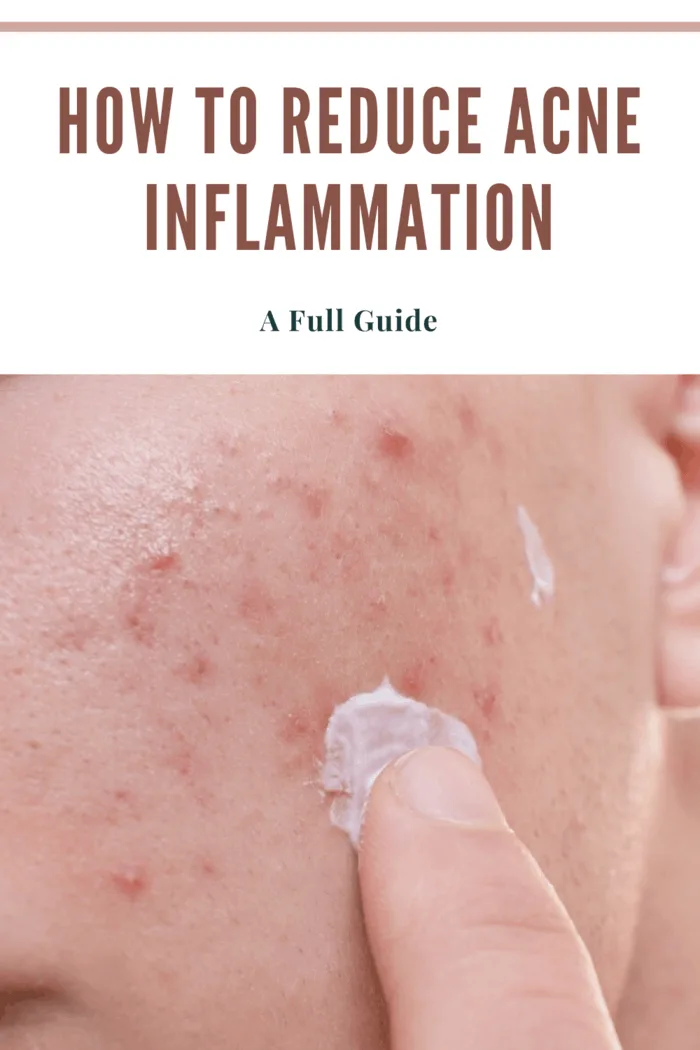Did you know that the skin makes up nearly 16% of your body weight? In fact, it’s the largest organ in the body.
At the same time, it’s also delicate—that is, it can be affected by various conditions.
Some examples include dermatitis, rosacea, and psoriasis.
Acne is also relatively common.
According to aad.org, in the United States alone, it affects up to 50 million individuals every year.
Are you dealing with the condition?
Want to know how to reduce acne inflammation?
If so, you’re on the right page.
We’ll be sharing a few tips below.
Find out what they are by reading the rest of the post!

What is Acne?
Acne is a chronic skin condition that’s characterized by spots and pimples on the skin.
More specifically, it occurs when the hair follicles become clogged with sebum and dead skin cells.
Eventually, bacteria can get trapped inside, which leads to redness and swelling.
While it can affect anyone, it’s generally more common in teens and younger adults.
Different Types of Acne
Generally speaking, there are two main types of acne—noninflammatory acne and inflammatory acne.
Let’s take a look at how they differ below.
Noninflammatory Acne
Noninflammatory acne refers to whiteheads and blackheads.
While they’re both due to clogged pores, whiteheads are different in that the top of the follicle is also closed up.
As a result, there will be a small protruding bump on the skin.
Inflammatory Acne
Inflammatory acne refers to pimples that are red and swollen.
More often than not, they’re caused by bacteria beneath the skin’s surface.
Subtypes within this category include papules, pustules, nodules, and cysts.
Compared to non-inflammatory acne, they’re generally more likely to spread and cause scarring.
Given that, it’s important to start treatment as soon as possible.
What Causes Acne?
Your skin contains oil glands that release sebum, which helps to keep your skin soft and lubricated.
Sometimes, however, too much oil is produced by the follicles.
When this happens, it can clog up your pores.
Dead skin cells can also accumulate, which contributes to the problem.
In some cases, bacteria can also trigger infection and inflammation resulting in more severe acne.
Risk Factors For Acne
Certain things can increase the risk of developing acne.
For example, it’s not uncommon for hormonal changes (e.g. puberty, pregnancy) to cause pimples.
Some medications such as corticosteroids and birth control pills can also contribute to the condition.
The same thing goes for refined carbohydrates and sugars—they can also increase your risk of acne.
7 Tips on How to Reduce Acne Inflammation and Improve Your Skin
The good news is that there are things that you can do to reduce acne inflammation.
Here are a few tips!
Moisturize Your Skin
Make sure to moisturize your skin—this is especially true if you’re using acne medications as many of them can be drying.
Not all moisturizers are made the same, though. Ideally, you want to use something that’s oil-free and non-comedogenic.
That way, they’ll be less likely to cause breakouts.
Wash Your Face Properly
Believe it or not but there is a right way to wash your face.
First things first, you always want to use warm water (hot water will strip your skin of its natural oils).
Use your fingers to apply cleanser to your face; gentle, circular motions work best.
When you’re done, rinse thoroughly and pat dry.
Avoid washing your face more than twice a day as it can actually worsen your acne.
Don’t Touch Your Face
Avoid touching your face with your hands.
The last thing that you want is to transfer dirt and oils onto your skin as it can cause breakouts.
Not to mention that you can transfer bacteria as well.
If you must touch your face, wash them with soap and warm water first.
Eat a Healthy Diet
Eating a healthy diet can help improve acne.
For example, it may be a good idea to stay away from sugars and carbohydrates.
Consider keeping a food diary if you suspect that there are certain foods that trigger your breakouts.
Don’t forget to stay hydrated as well by drinking water.
Use Oil-Free Makeup
While there’s nothing wrong with using makeup to cover blemishes, using the wrong kind can make your breakouts worse.
For example, it’s not uncommon for greasy products such as those containing mineral oil or cocoa butter to aggravate acne.
Instead, you want to use something that’s water-based and oil-free.
Don’t Overexfoliate Your Skin
Regular exfoliation can help smooth the skin.
You don’t want to do it too often, though, as it can actually have the opposite effect.
Not only can it cause redness and inflammation but it can also pull away healthy skin cells.
As a result, your acne will be more likely to scar.
Use CBD Oil
CBD oil is a product that’s derived from the hemp plant.
Known for its health benefits, it’s often used to treat pain and anxiety.
That’s not all, there’s evidence that it can also help with acne.
More specifically, it inhibits oil production and also has anti-inflammatory effects on sebum glands.
For those who are interested in giving it a try, you can get CBD online or at local health stores.
Combating Acne
And there you have it—seven tips on how to reduce acne inflammation.
As you can see, there’s more than one thing that you can do for your skin.
For more health-related posts, visit the rest of our site!
